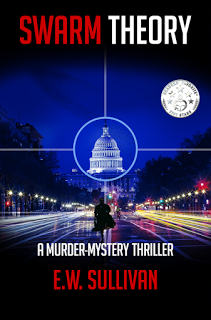J. David Core's Blog, page 11
September 7, 2016
Guest Post: The Whole Thing About Existence by Arthur M. Doweyko, PhD
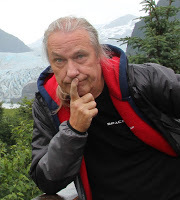
After retiring in 2009, Arthur M. Doweyko took up writing fiction. His novel Algorithm garnered a 2010 Royal Palm Literary Award. He has also published a number of short stories, many of which have been selected as Finalists in the Royal Palm Literary Award contest, and two Honorable Mentions in the L. Ron Hubbard Writers of the Future Contest.
Arthur was awarded the 2008 Thomas Alva Edison Patent Award for his contribution to the discovery of Sprycel, a novel anti-cancer drug successfully brought to the marketplace in 2009. He has authored over one hundred publications (papers, abstracts, patents, book chapters) and has been an invited lecturer in a number of drug-discovery and computational venues.
Arthur lives in Florida with the love of his life, Lidia. When he’s not writing, he’s happily wandering the beaches.
As Wings UnfurlOkay, so this could possibly be an exercise in deep thinking. Or not.The single most important question we could ever ask is the one we will never get an answer for.Applegate Bogdanski returns from Vietnam with a missing leg, a Purple Heart, and an addiction to morphine. He stumbles through each day, looking forward to nothing and hoping it will arrive soon. When he attempts to thwart a crime, he is knocked unconscious and wakes up to discover that people are once again calling him a hero, though he feels undeserving of the praise.
Apple returns to work and meets Angela, a mysterious woman who claims to be his guardian. Immediately, he feels a connection to her, which morphs into an attraction. But he soon discovers that Angela is much more than she seems.
Apple and Angela are swept up in a conspiracy that stretches through time and space. Together, they must fight to save everything they hold dear from an alien race bent on destroying humanity.
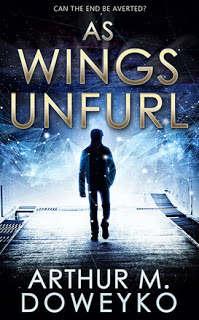 Put in a simple way: "What the hell is going on?" implying… Why are we here? What is this place? Does something else come next? It's a favorite topic in science fiction, whether addressed head on or implied, in fact, it underlies both my debut novel, Algorithm and As Wings Unfurl.
Put in a simple way: "What the hell is going on?" implying… Why are we here? What is this place? Does something else come next? It's a favorite topic in science fiction, whether addressed head on or implied, in fact, it underlies both my debut novel, Algorithm and As Wings Unfurl.In Algorithm I used the premise that a large part of our DNA is responsible for instinct, that for humans has a very specific purpose. In As Wings Unfurl the idea is that we have been fooled into a belief of evolutionary origins, and that the biblical accounts may be more accurate.
Philosophers, theologians, and even scientists have sought the answer, but we all know deep down that isn't going to happen. That grim fact alone is really quite an interesting clue to the answer itself. And there are other clues.
When a question is posed that really cannot be answered, the reason is either it's not a legitimate question or we aren't capable of understanding the answer. An illegitimate question is one that sounds logical but is poisoned with a logical impossibility. For example, when an irresistible force meets an immovable object, what happens? Here it's clear that the question has no logical underpinning. You simply can't ask that question!
Does asking about the Universe and our place in it fall into such a false trap? In this case, we may be faced with an answer that we cannot understand. Theologians would point to scripture and belief systems that explain everything. The supposition is that we don't have all the facts, and may never get them. However, even in a belief system, there are questions that can be posed, that we need to relegate to a higher authority… admitting we will never understand the answers as living human beings.
It seems the question of existence is like the endless series of "whys" a child might dish out, which usually result in parental exasperation. There is a limit to our understanding, and that limit derives from the type of logic we use.
Our logic was developed by a life form obsessed with survival. That's how we came to be. The way we think is entirely based on getting food, shelter, and staying out of deadly trouble. All this came about over a period of millions of years on a tiny dust mote called the Earth, stuck in a corner of a galaxy containing 100 billion stars in a universe containing at least 10 billion galaxies. The numbers are staggering. But the point is that our way of thinking came about in an exceedingly parochial way in a negligible part of the universe. Our logic may not apply to the bigger picture. When we ask a question aimed at the entire universe, we make the crass assumption that the universe and all its moving parts follow our brand of logic. Heck, even the language we use may not apply.
Aristotle once declared he was able to prove the existence of God. His approach is sometimes referred to as the First Cause. The assumption, made logically, is that all things have a cause. Applying this cause/effect relationship to anything will ultimately lead to the First Cause. For example, why is there wind? The air is moved by the heat from the sun. Why does the sun heat the air? Its thermonuclear reactions give off heat and we happen to be near enough to feel it. Why is there a sun? Matter was attracted by gravitational forces, and when an enormous amount was squished together, atoms fell apart. How did the atoms come to be? They are the consequence of the Big Bang, where matter for some reason chose to appear from nowhere and take on the form of atoms. Now we're getting in trouble.
To Aristotle the Big Bang could easily be interpreted as God. To physicists, it's just one of those curiosities that maybe someday we'll understand. Interestingly, the logical problem with the First Cause is that there is no proof that all things in the universe need to have a cause. (Just like the Big Bang). Here, logic itself demands that we be careful in extrapolating a series of deductions.
I propose that the question so dear to us all, is one that makes no sense. Just like a square circle, the question itself is simply not allowed.
Don't feel bad or get mad. Logic, like everything else, has its limits.
I mentioned other clues early in this essay. They are all around us. Matter is made of something, right? What exactly is that? Ah…silly question? We're great at taking things apart, giving them names, studying how they interact. But we will never ever know what matter is. That, right there, is a clue!
Another clue: did you know that all attempts to produce a perfect vacuum have failed. Put in another way, we cannot create a space with nothing in it. Read that as trying to produce a tiny spot where nothing exists. Reason? Because something always shows up. Light and/or tiny particles of matter manage to be created. Out of nothing!!!
Another: entangled particles … one can separate subatomic particles that usually exist as pairs. Whatever is done to one particle happens to the other at the very same time, regardless of distance between them. Einstein called this "spooky." It defies reason, but does suggest what we are seeing is not at all what really exists.
Finally, how is it that after the Big Bang, matter chose to form into atoms? It's peculiar because atoms have properties which are anthropomorphic … that is, they have likes and dislikes, which persist through higher levels of complexity, all the way through to us. It's puzzling that matter came together in the form of building blocks.
Existence is a strange phenomenon. It resists eradication. Matter behaves as if it's all part of one thing—odd little observations, but deeply meaningful. At this point, one could draw the conclusion that we are immortal, based on the fact that all our atoms will continue to exist after we die. It seems matter will last forever, either in the form of solids or energy, since it and energy have nowhere to go. They simply cannot unexist.
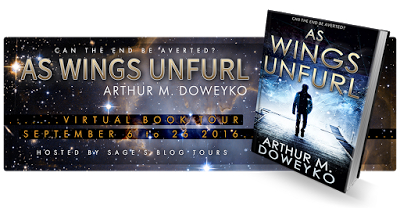 For more such oddities, strange discoveries, and even some thoughts about science fiction, please feel free to visit www.ArthurMDoweyko.com/blog
For more such oddities, strange discoveries, and even some thoughts about science fiction, please feel free to visit www.ArthurMDoweyko.com/blog
Published on September 07, 2016 02:04
August 30, 2016
Should Authors Use Booktrack: My Opinion
Several months ago, I decided to put my noir collection,
8 Tales of Noir
, into the Booktrack program after hearing an interview with CEO and co-founder of Booktrack, Paul Cameron, conducted by Joanna Penn of the Creative Penn. The thing Paul said that closed the deal for me was that as a fairly new platform, new authors could gain traction by being one of the few options available on the site. Those weren’t his exact words, but that was the gist I took from it.

For the uninitiated, Booktrack is a website and app that allows readers to listen to a soundtrack which is partly synced to their reading rate. Thematic music is a part of the experience, but there are also sound effects. The music and ambient noises begin when the reader enters a scene, and once the program learns your reading speed, it times sound effects to coincide with when the reader reaches a specific event.
So I spent about a week late at nights creating a Booktrack version of my book. All tolled, it probably consisted of about a 20-hour investment of my time. I found the interface easy to learn and apply, and the process was actually kind of fun – once. If I had to do it for all of my books, I’m certain the process would quickly become a chore. And luckily, Booktrack offers professional services for those who do not wish to compile their own, or be bothered learning the process.
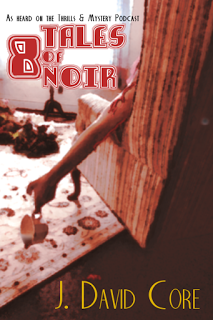 So I worked diligently until I was satisfied that my book was as good as I could make it. I chose the music carefully; I found fitting sound effects for almost every grunt and door slam; and when I was stumped, I found suitable alternatives. For example, one of my stories features a fly flitting about from scene to scene, but there was no buzzing fly sound effect available. However there was a mosquito and other insect noises which to anyone other than a trained entomologist will suffice quite nicely.
So I worked diligently until I was satisfied that my book was as good as I could make it. I chose the music carefully; I found fitting sound effects for almost every grunt and door slam; and when I was stumped, I found suitable alternatives. For example, one of my stories features a fly flitting about from scene to scene, but there was no buzzing fly sound effect available. However there was a mosquito and other insect noises which to anyone other than a trained entomologist will suffice quite nicely.
When it was all said and done, on Valentine's Day I pressed publish, and … nothing.
Turns out, my paid version does not even show up as a purchasable option on the app store. I queried about this, and learned that the app servicers (android and Apple) take too big a slice. So the book is ONLY available for purchase on the website, and then only after a direct search for my author name. It doesn't even come up doing a title search for crying out loud. Oh, I suppose if one wades through the hundreds and hundreds of FREE options (which for some reason get all the prime real estate), one might eventually stumble on my cover, but I’m not holding my breath for that.
So how many copies have I sold? That’s another great question. I assume zero, but for all I know there have been a few sales. I mean, somebody gave it a 4-star rating after all. (Possibly somebody who clicked over from my mailing list or Facebook page.) But there’s no dashboard, no sales ranking, no downloadable sales history … no nothing. I have received one lone email telling me I haven’t earned the sales threshold for a royalty payment yet. Other than that, I have no idea what the heck is going on.
Of course there's always the possibility that my book isn't selling because it's not enticing enough. That's a possibility, but not a certainty. However, one certain thing is that it can't sell if it's utterly undiscoverable.
So I’m afraid I can’t recommend Booktrack for authors. At least not until they address these issues. Sorry.
It's a shame too. The Booktrack version of my book is pretty dang cool. You should check it out.

For the uninitiated, Booktrack is a website and app that allows readers to listen to a soundtrack which is partly synced to their reading rate. Thematic music is a part of the experience, but there are also sound effects. The music and ambient noises begin when the reader enters a scene, and once the program learns your reading speed, it times sound effects to coincide with when the reader reaches a specific event.
So I spent about a week late at nights creating a Booktrack version of my book. All tolled, it probably consisted of about a 20-hour investment of my time. I found the interface easy to learn and apply, and the process was actually kind of fun – once. If I had to do it for all of my books, I’m certain the process would quickly become a chore. And luckily, Booktrack offers professional services for those who do not wish to compile their own, or be bothered learning the process.
 So I worked diligently until I was satisfied that my book was as good as I could make it. I chose the music carefully; I found fitting sound effects for almost every grunt and door slam; and when I was stumped, I found suitable alternatives. For example, one of my stories features a fly flitting about from scene to scene, but there was no buzzing fly sound effect available. However there was a mosquito and other insect noises which to anyone other than a trained entomologist will suffice quite nicely.
So I worked diligently until I was satisfied that my book was as good as I could make it. I chose the music carefully; I found fitting sound effects for almost every grunt and door slam; and when I was stumped, I found suitable alternatives. For example, one of my stories features a fly flitting about from scene to scene, but there was no buzzing fly sound effect available. However there was a mosquito and other insect noises which to anyone other than a trained entomologist will suffice quite nicely. When it was all said and done, on Valentine's Day I pressed publish, and … nothing.
Turns out, my paid version does not even show up as a purchasable option on the app store. I queried about this, and learned that the app servicers (android and Apple) take too big a slice. So the book is ONLY available for purchase on the website, and then only after a direct search for my author name. It doesn't even come up doing a title search for crying out loud. Oh, I suppose if one wades through the hundreds and hundreds of FREE options (which for some reason get all the prime real estate), one might eventually stumble on my cover, but I’m not holding my breath for that.
So how many copies have I sold? That’s another great question. I assume zero, but for all I know there have been a few sales. I mean, somebody gave it a 4-star rating after all. (Possibly somebody who clicked over from my mailing list or Facebook page.) But there’s no dashboard, no sales ranking, no downloadable sales history … no nothing. I have received one lone email telling me I haven’t earned the sales threshold for a royalty payment yet. Other than that, I have no idea what the heck is going on.
Of course there's always the possibility that my book isn't selling because it's not enticing enough. That's a possibility, but not a certainty. However, one certain thing is that it can't sell if it's utterly undiscoverable.
So I’m afraid I can’t recommend Booktrack for authors. At least not until they address these issues. Sorry.
It's a shame too. The Booktrack version of my book is pretty dang cool. You should check it out.
Published on August 30, 2016 05:00
August 21, 2016
Author Spotlight: Renée Pawlish, Author of It Doesn't Happen in the Movies
Editor's Note:Renée Pawlish is the mastermind behind the monthly Team Mystery Thriller promos. She doesn't even have a dog in the race this month, but she generously coordinates and hosts the promo anyway.
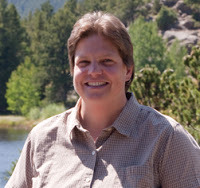 Renée Pawlish is the award-winning author of the bestselling Reed Ferguson mystery series, the Dewey Webb mystery series, horror bestseller Nephilim Genesis of Evil, The Noah Winters YA Adventure series, middle-grade historical novel This War We're In, Take Five, a short story collection, and The Sallie House: Exposing the Beast Within, a nonfiction account of a haunted house investigation.
Renée Pawlish is the award-winning author of the bestselling Reed Ferguson mystery series, the Dewey Webb mystery series, horror bestseller Nephilim Genesis of Evil, The Noah Winters YA Adventure series, middle-grade historical novel This War We're In, Take Five, a short story collection, and The Sallie House: Exposing the Beast Within, a nonfiction account of a haunted house investigation.Renée has been called "a promising new voice to the comic murder mystery genre" and "a powerful storyteller". Nephilim Genesis of Evil has been compared to Stephen King and Frank Peretti.
Renée was born in California, but has lived most of her life in Colorado.
This Doesn't Happen in the Movies
A wannabe private eye with a love of film noir and detective fiction.
A rich, attractive femme fatale.
A missing husband.
A rollicking ride to a dark and daring ending
Reed Ferguson’s first case is a daring adventure, complete with a dose of film noir, and a lot of humor. With a great supporting cast of the Goofball Brothers, Reed’s not too bright neighbors, and Cal, Reed’s computer geek friend, This Doesn’t Happen In The Movies is detective noir at its best. Follow Reed as he solves crime akin to his cinematic hero, Humphrey Bogart.Sample:
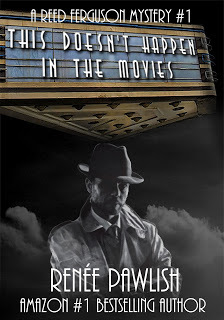
“I want you to find my dead husband.”“Excuse me?” That was my first reaction.“I want you to find my husband. He’s dead, and I need to know where he is.” She spoke in a voice one sexy note below middle C.“Uh-huh.” That was my second reaction. Really slick.Moments before, when I saw her standing in the outer room, waiting to come into my office, I had the feeling she’d be trouble. And now, with that intro, I knew it.“He’s dead, and I need you to find him.” If she wasn’t tired of the repetition, I was, but I couldn’t seem to get my mouth working. She sat in the cushy black leather chair on the other side of my desk, exhaling money with every sultry breath. She had beautiful blond hair with just a hint of darker color at the roots, blue eyes like a cold mountain lake, and a smile that would slay Adonis. I’d like to say that a beautiful woman couldn’t influence me by her beauty alone. I’d like to say it, but I can’t.“Why didn’t you come see me yesterday?” I asked. Her eyes widened in surprise. This detective misses nothing, I thought, mentally patting myself on the back. She didn’t know that I’d definitely noticed her yesterday eating at a deli across the street. I had been staring out the window, and there she was.The shoulders of her red designer jacket went up a half-inch and back down, then her full lips curled into the trace of a smile. “I came here to see you, but you were leaving for lunch. I followed you, and then I lost my nerve.”“I see you’ve regained it.” I’ve never been one to place too much importance on my looks, but I suddenly wished I could run a comb through my hair, put on a nicer shirt, and splash on a little cologne. And change my eye color – hazel – boring. It sounded like someone’s old, spinster aunt, not an eye color.She nodded. “Yes. I have to find out about my husband. He’s dead, I know it. I just know it.” Her tone swayed as if in a cool breeze, with no hint of the desperation that should’ve been carried in the words.“But he’s also missing,” I said in a tone bordering on flippant, as I leaned forward to unlock the desk drawer where I kept spare change, paper clips, and my favorite gold pen. Maybe writing things down would help me concentrate. But I caught a whiff of something elegant coming from her direction, and the key I was holding missed the lock by a good two inches. I hoped she didn’t see my blunder. I felt my face getting warm and assumed my cheeks were turning crimson. I hoped she didn’t see that either.Perhaps I was being too glib because she glanced back toward the door as if she had mistaken my office for another. “This is the Ferguson Detective Agency? You are Reed Ferguson?”“It is and I am.” I smiled in my most assured manner, then immediately questioned what I was doing. This woman was making no sense and here I was, flirting with her like a high-school jock. I glanced behind her at the framed movie poster from the The Big Sleep, starring Humphrey Bogart and Lauren Bacall. It was one of my favorites, and I hung the poster in my office as a sort of inspiration. I wanted to be as cool as Bogie. I wondered what he would do right now.She puckered pink lips at me. “I need your help.”“That’s what I’m here for.” Now I sounded cocky.The pucker turned into a fully developed frown. “I’m very serious, Mr. Ferguson.”“Reed.” I furrowed my brow and looked at my potential first client with as serious an expression as I could muster. I noticed for the first time that she applied her makeup a bit heavy, in an attempt to cover blemishes.“Reed,” she said. “Let me explain.” Now we were getting somewhere. I found the gold pen, popped the top off it and scrounged around another drawer for a notepad. “My name is Amanda Ghering.” She spoke in an even tone, bland, like she was reading a grocery list. “My husband, Peter, left on a business trip three weeks ago yesterday. He was supposed to return on Monday, but he didn’t.”
If you'd like to check out Renée's books, her links are just below. Or to check out the promo, go to Renée Pawlish's website where all of the books in this giveaway are available.
Amazon Author PageWebsiteBlogYou can also find It Doesn't Happen in the Movies at the following links:Amazon
iTunes
B&N
Published on August 21, 2016 05:44
August 20, 2016
Author Spotlight: M. W. Griffith, Author of The Cold Bending Light
Editor's Note
The Team Mystery/Thriller promo returns this month with another round of free titles on the 20th and 21st of August. I do not have a pony in the race this go around, but I still plan to do my part to pay-it-forward and promote those who do. With that in mind, this weekend I will be spotlighting two of the books and their authors. Today, we're spotlighting author M.W. Griffith.
 Michael Griffith was born in Carthage, Tennessee, and now lives in Murfreesboro TN after marrying his best friend. He is the author of several bestselling mysteries, including The Truth About Alex and Monsoon Morning. He is currently studying history at Middle Tennessee State University. Always a storyteller at heart, Michael enjoys nothing more than sharing his tales with the world.
Michael Griffith was born in Carthage, Tennessee, and now lives in Murfreesboro TN after marrying his best friend. He is the author of several bestselling mysteries, including The Truth About Alex and Monsoon Morning. He is currently studying history at Middle Tennessee State University. Always a storyteller at heart, Michael enjoys nothing more than sharing his tales with the world.There's nothing worse than not knowing...
On a hot summer evening, a young woman’s body is discovered in a small Tennessee town. When another girl vanishes on her way home from work, Special Agent Selena Marrenger takes on the case. All signs point to a terrifying serial killer with a unique modus operandi: a chemical used in state executions that isn’t found in Tennessee.
As Selena inches closer to the unnerving truth, she starts to believe that something much larger - and sinister - is at play. Probing local law enforcement for answers unearths a well-hidden secret woven into the fabric of truth, justice, and madness…
In this fast paced novel where nothing is quite what it seems, M.W. Griffith leads readers on a dangerous, twisting quest to bring justice to families whose lives have been changed forever by tragedy.
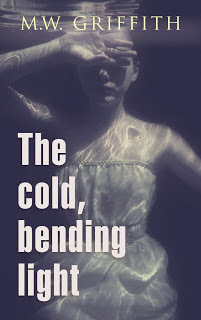 CHAPTER ONEIt had been another sweltering day in Middle Tennessee. Kristi Gillings’ mother told her it was too hot for kids to be running around and driving her crazy. A broken air conditioner meant they were all sweating in the late afternoon.It was time to play outside.Nobody had to tell Charlie, Kristi’s older brother, twice. He ran into the front yard with their younger sister, Elissa, carrying icy cold push pops and holding them up in the air just out of both girls reach. When Elissa began to cry, Kristi kicked her brother hard in the shin. He toppled over in the grass, and she snatched up her sister’s frozen treat.“I’m telling!” Charlie’s voice squeaked. He scrambled to his feet, red-faced. “You’re going to be in big trouble. Mom already told you, remember? One strike left. You are so dead!”Kristi bent down and handed the push pop to her sister. “Go on and do it then.” She directed a glare at Charlie. “You’re just a tattle-tail. Momma ain’t always gonna be there for you to run to!”When her brother stomped up the steps and through the screen door, Kristi panicked.She grabbed her bike from the garage and sped off down the road, leaving Elissa bewildered in the yard.Kristi just needed to cool down. There was no way she would be able to face a third strike from her mother. Summer wouldn’t last forever, and she didn’t want to spend the rest of it grounded to her room. She was eleven years old, for crying out loud! When was she going to be treated like it? Just because Charlie was thirteen didn’t mean their mother always had to take his side.Her bicycle tires crunched through the dirt along an uphill path less than a mile away from home. Thunder rolled faintly in the distant west. It was just after five, and the sun was drifting down in the late summer sky. The clouds became tinged with orange and red.Kristi had to turn around. She knew the distance. She could make it back before the first droplets fell if she hurried.The road was still, quiet. It cut a gash through the woods and wound like a snake across the hills. A cool evening wind pushed against the trees, lifting her corkscrew pigtails, and the sound reminded her of the ocean in Florida. They had vacationed there with relatives when school first let out. Silently, she smiled at the gentle waves crashing against the shore of memory.Fireflies danced between the trunks. She watched them streak by as she peddled up the hill. Her legs burned from the effort, but when the road leveled out, she glided along and enjoyed the air on her freckled cheeks.Lightning pulsed between heavy clouds. The storm was getting closer. Thunder cracked above, making her heart leap. Ahead, there was a turnoff leading back to her neighborhood. Almost there, she thought. Time to deal with that third strike.* * *Julia Fowler and Dylan Farrow sat on a grassy outcropping overlooking the carnival lights below. The two teenagers had just finished taking a dip in the creek behind her house. They snuck a six pack of beer from the refrigerator in his dad’s garage earlier; a locally brewed pale ale that was stronger than what they were used to, but they planned on celebrating before school started back.“It’s beautiful,” she whispered, the lights sparkling in her eyes.“I’ll say,” he breathed, sliding a hand along her lightly browned skin.Julia pulled her chocolate brown hair back into a loose ponytail. She wore the green two piece bathing suit especially for him. “Not what I meant, but okay.”Lightning lanced across the sky, followed by a deep concussion of thunder.“Shit,” she said, leaning into his gentle nibbles along her neck. “Maybe we should head back.”“Are you kidding me? That storm’s at least five miles away. We can hang out here for a little bit longer.” He moved his hand to her thigh. “You’re so hot.”Julia let him kiss her ear, down to her bare shoulders, savoring each movement. All the while, her eyes remained locked on the lights from the summer carnival below. It was a tradition in Cedar Brook that had spanned almost fifty years. She remembered riding the Ferris wheel when she was little, and the sinking feeling in her gut when it rose to the highest point and the entire town sprawled out before her.Dylan abruptly rose. “Sorry.” He laughed, covering the erection in his swim trunks with both hands. “I really gotta piss. Been holding it and I didn’t want to ruin the mood.”Julia rolled her eyes. “Fine,” she said before putting earbuds in and switching on her iPod. “Make it quick, Romeo. That storm is moving in pretty fast.”* * *Dylan Farrow stepped into the surrounding woods and glanced over his shoulder at his girlfriend. She arched her back, both eyes closed, and lit only by the town beneath the outcropping. He could imagine that she was a dream, and that any moment he would wake up to the boring life he’d had before she came along. There was a gentleness to her, a classic sort of beauty he didn’t find in other girls.Finally, he turned around and moved an appropriate distance away. There was a large tree with a hole in the trunk, split open by lightning long ago. He stepped forward and placed a hand on its ancient bark. Sometimes, he wondered what sort of things trees have seen in their lifetime. The comings and goings of nature, and people like himself sneaking off into the woods to get it on.When he was finished, he made his way back. The wind had picked up, brushing coldly over his bare skin. More lightning bloomed above the little town.Julia wasn’t there.“Jules? Hey, Jules where’d you go?”He stepped closer to where they had been sitting only moments before. The half empty six pack was sill where he remembered next to her open purse. The headphones and iPod lay in the grass a short distance away. He looked east and then west, peering in the near dark with squinted eyes. Finally, he stepped towards the outcropping and looked down.The lights from the carnival rides were turning off one after the other.“Jules?” Where was she?Instinctively, he pulled his phone out and dialed her number. Julia’s phone lit up and buzzed inside her purse. He hit the end button and then dialed 911.“911, what’s your emergency?”“My girlfriend’s gone,” the words shot out of his mouth.“Your girlfriend left you?” The operator sounded like she had heard the same thing a million times that day.“No, I mean she was here one minute and the next she’s just gone.”“Did you and your girlfriend have an argument?”“No!” He ran a hand over his shaved head. “Even if we did, she wouldn’t just up and leave without her cellphone or her purse. That’s not like her.”“I can send a patrol car. What’s your location?”“122 Hillcrest. It’s her parents’ house.”“Are her parents home now?”“No.”“Okay, I’m sending an officer out there. Are you inside the house?”“No. We cooled off in the creek around back. There’s a clearing in the woods on the other side.”“Stay where you are, okay? An officer will be there shortly.”“Thanks.” He stuffed the phone into his pocket just as the first cold drops of rain began to fall. It would be completely dark soon. When he turned to face the woods, Dylan couldn’t help but to wonder what the trees saw.
CHAPTER ONEIt had been another sweltering day in Middle Tennessee. Kristi Gillings’ mother told her it was too hot for kids to be running around and driving her crazy. A broken air conditioner meant they were all sweating in the late afternoon.It was time to play outside.Nobody had to tell Charlie, Kristi’s older brother, twice. He ran into the front yard with their younger sister, Elissa, carrying icy cold push pops and holding them up in the air just out of both girls reach. When Elissa began to cry, Kristi kicked her brother hard in the shin. He toppled over in the grass, and she snatched up her sister’s frozen treat.“I’m telling!” Charlie’s voice squeaked. He scrambled to his feet, red-faced. “You’re going to be in big trouble. Mom already told you, remember? One strike left. You are so dead!”Kristi bent down and handed the push pop to her sister. “Go on and do it then.” She directed a glare at Charlie. “You’re just a tattle-tail. Momma ain’t always gonna be there for you to run to!”When her brother stomped up the steps and through the screen door, Kristi panicked.She grabbed her bike from the garage and sped off down the road, leaving Elissa bewildered in the yard.Kristi just needed to cool down. There was no way she would be able to face a third strike from her mother. Summer wouldn’t last forever, and she didn’t want to spend the rest of it grounded to her room. She was eleven years old, for crying out loud! When was she going to be treated like it? Just because Charlie was thirteen didn’t mean their mother always had to take his side.Her bicycle tires crunched through the dirt along an uphill path less than a mile away from home. Thunder rolled faintly in the distant west. It was just after five, and the sun was drifting down in the late summer sky. The clouds became tinged with orange and red.Kristi had to turn around. She knew the distance. She could make it back before the first droplets fell if she hurried.The road was still, quiet. It cut a gash through the woods and wound like a snake across the hills. A cool evening wind pushed against the trees, lifting her corkscrew pigtails, and the sound reminded her of the ocean in Florida. They had vacationed there with relatives when school first let out. Silently, she smiled at the gentle waves crashing against the shore of memory.Fireflies danced between the trunks. She watched them streak by as she peddled up the hill. Her legs burned from the effort, but when the road leveled out, she glided along and enjoyed the air on her freckled cheeks.Lightning pulsed between heavy clouds. The storm was getting closer. Thunder cracked above, making her heart leap. Ahead, there was a turnoff leading back to her neighborhood. Almost there, she thought. Time to deal with that third strike.* * *Julia Fowler and Dylan Farrow sat on a grassy outcropping overlooking the carnival lights below. The two teenagers had just finished taking a dip in the creek behind her house. They snuck a six pack of beer from the refrigerator in his dad’s garage earlier; a locally brewed pale ale that was stronger than what they were used to, but they planned on celebrating before school started back.“It’s beautiful,” she whispered, the lights sparkling in her eyes.“I’ll say,” he breathed, sliding a hand along her lightly browned skin.Julia pulled her chocolate brown hair back into a loose ponytail. She wore the green two piece bathing suit especially for him. “Not what I meant, but okay.”Lightning lanced across the sky, followed by a deep concussion of thunder.“Shit,” she said, leaning into his gentle nibbles along her neck. “Maybe we should head back.”“Are you kidding me? That storm’s at least five miles away. We can hang out here for a little bit longer.” He moved his hand to her thigh. “You’re so hot.”Julia let him kiss her ear, down to her bare shoulders, savoring each movement. All the while, her eyes remained locked on the lights from the summer carnival below. It was a tradition in Cedar Brook that had spanned almost fifty years. She remembered riding the Ferris wheel when she was little, and the sinking feeling in her gut when it rose to the highest point and the entire town sprawled out before her.Dylan abruptly rose. “Sorry.” He laughed, covering the erection in his swim trunks with both hands. “I really gotta piss. Been holding it and I didn’t want to ruin the mood.”Julia rolled her eyes. “Fine,” she said before putting earbuds in and switching on her iPod. “Make it quick, Romeo. That storm is moving in pretty fast.”* * *Dylan Farrow stepped into the surrounding woods and glanced over his shoulder at his girlfriend. She arched her back, both eyes closed, and lit only by the town beneath the outcropping. He could imagine that she was a dream, and that any moment he would wake up to the boring life he’d had before she came along. There was a gentleness to her, a classic sort of beauty he didn’t find in other girls.Finally, he turned around and moved an appropriate distance away. There was a large tree with a hole in the trunk, split open by lightning long ago. He stepped forward and placed a hand on its ancient bark. Sometimes, he wondered what sort of things trees have seen in their lifetime. The comings and goings of nature, and people like himself sneaking off into the woods to get it on.When he was finished, he made his way back. The wind had picked up, brushing coldly over his bare skin. More lightning bloomed above the little town.Julia wasn’t there.“Jules? Hey, Jules where’d you go?”He stepped closer to where they had been sitting only moments before. The half empty six pack was sill where he remembered next to her open purse. The headphones and iPod lay in the grass a short distance away. He looked east and then west, peering in the near dark with squinted eyes. Finally, he stepped towards the outcropping and looked down.The lights from the carnival rides were turning off one after the other.“Jules?” Where was she?Instinctively, he pulled his phone out and dialed her number. Julia’s phone lit up and buzzed inside her purse. He hit the end button and then dialed 911.“911, what’s your emergency?”“My girlfriend’s gone,” the words shot out of his mouth.“Your girlfriend left you?” The operator sounded like she had heard the same thing a million times that day.“No, I mean she was here one minute and the next she’s just gone.”“Did you and your girlfriend have an argument?”“No!” He ran a hand over his shaved head. “Even if we did, she wouldn’t just up and leave without her cellphone or her purse. That’s not like her.”“I can send a patrol car. What’s your location?”“122 Hillcrest. It’s her parents’ house.”“Are her parents home now?”“No.”“Okay, I’m sending an officer out there. Are you inside the house?”“No. We cooled off in the creek around back. There’s a clearing in the woods on the other side.”“Stay where you are, okay? An officer will be there shortly.”“Thanks.” He stuffed the phone into his pocket just as the first cold drops of rain began to fall. It would be completely dark soon. When he turned to face the woods, Dylan couldn’t help but to wonder what the trees saw.If you'd like to check out MW's books, his links are just below. Or to check out the promo, go to Renée Pawlish's website where all of the books in this giveaway are available.
Website: http://mwgriffithbooks.comTwitter: @emberianNewsletter Sign-up: sign-up
Amazon Kindle Bestselling Books By M.W. Griffith The Runaway Train - Buy At AmazonThe Truth About Alex - Buy At AmazonMonsoon Morning - Buy At AmazonTanglewood - Buy At Amazon
Published on August 20, 2016 05:00
August 6, 2016
Guest Post: The Influences behind Rebirth of the Gangster by CJ Standal
Author Bio
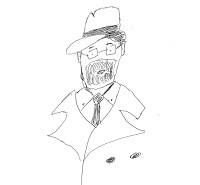 CJ Standal is an author and owner of his own publishing company, CJ Standal Productions. For the last six months he has been writing his self-published comic Rebirth of the Gangster--illustrated by the great Juan Romera--and he has had some journalistic work published in the now defunct Slant. He is obsessed with entertainment in any type of media and genre and has been reading comics since he was eight years old.When he’s not writing, CJ Standal can be found teaching high school English. In order to keep his teaching and writing worlds separate, he uses the pseudonym CJ Standal. As a teacher and author he hopes to spark the same love of reading and stories in the next generation.
CJ Standal is an author and owner of his own publishing company, CJ Standal Productions. For the last six months he has been writing his self-published comic Rebirth of the Gangster--illustrated by the great Juan Romera--and he has had some journalistic work published in the now defunct Slant. He is obsessed with entertainment in any type of media and genre and has been reading comics since he was eight years old.When he’s not writing, CJ Standal can be found teaching high school English. In order to keep his teaching and writing worlds separate, he uses the pseudonym CJ Standal. As a teacher and author he hopes to spark the same love of reading and stories in the next generation.
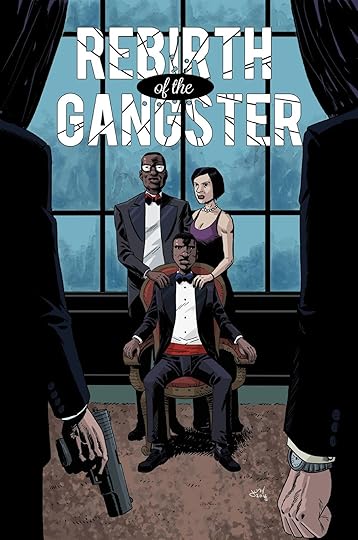
“The Seeds of Rebirth of the Gangster: Pruning the Comic’s ‘Family Tree’ of Influences”
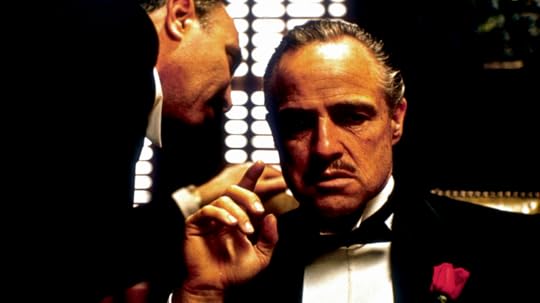 My brothers and I huddled in front of the TV, our dad sitting on the couch to save his already deteriorating eyesight the strain; but no matter where we were, all our eyes were glued on the Don.
My brothers and I huddled in front of the TV, our dad sitting on the couch to save his already deteriorating eyesight the strain; but no matter where we were, all our eyes were glued on the Don.
We were in our early to mid-teens, and we were watching that great American classic, The Godfather. And whether I knew it or not, this movie would have a profound effect on me in the coming days, months and years. It’s not just that the movie walks a delicate tightrope between light and darkness, family and self-determination, sympathy and apathy, restraint and violence. And it’s not just that this was one of the few moments where my dad tossed his work obligations out of sight for a rare moment of bonding with his sons. No, it wasn’t any of those things that forged this into that nugget of gold shining in the murk of memory. What gave this movie its luster was that it sparked a desire that would never be satisfied, that could never find enough fuel for its flame: a desire that eventually launched me onto the path of writing Rebirth of the Gangster, my gangster greed so great that I wasn’t going to be satisfied until I was able navigate those dark waters myself.
 Aside from the obvious debt, Rebirth of the Gangster owes much more to gangster classics new and old than I’m willing to admit, classics like The Godfather, The Big Sleep, 100 Bullets, Breaking Bad, and The Wire. But--history student that I am--I realize that sometimes the only way to move forward is to look back.
Aside from the obvious debt, Rebirth of the Gangster owes much more to gangster classics new and old than I’m willing to admit, classics like The Godfather, The Big Sleep, 100 Bullets, Breaking Bad, and The Wire. But--history student that I am--I realize that sometimes the only way to move forward is to look back.
And speaking of looking back: that struggle between tradition and innovation--between loyalty and independence--is probably the biggest thread I pulled out of The Godfather when I was weaving the tapestry of Rebirth of the Gangster. In The Godfather, Michael Corleone returns home after trying to escape his family’s hold, and reluctantly grabs the reins of The Family, hoping to steer it into a new world of light instead of darkness, of legitimacy instead of lawlessness. This same struggle opens Rebirth of the Gangster and frames Marcus’s whole journey throughout the comic.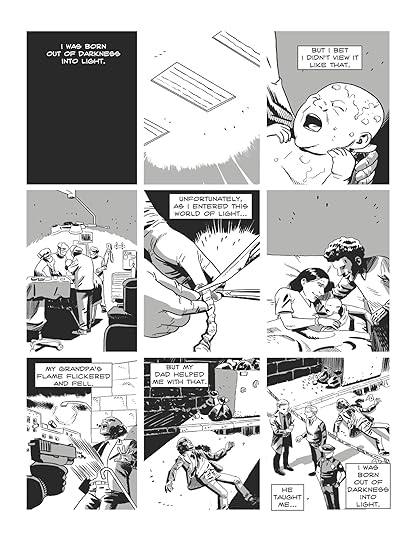
Can Marcus escape the death surrounding his family’s past? Will he give in to his dad’s obsession with image and responsibility, an obsession born out of his dad’s desire to hide the shadows of the past? Or will he repeat the same mistakes of his dad, backsliding into darkness, ironically because of his father’s impulse to keep him in the dark? Replace Marcus with Michael in those previous questions, and I could just as easily be describing Coppola’s masterpiece.
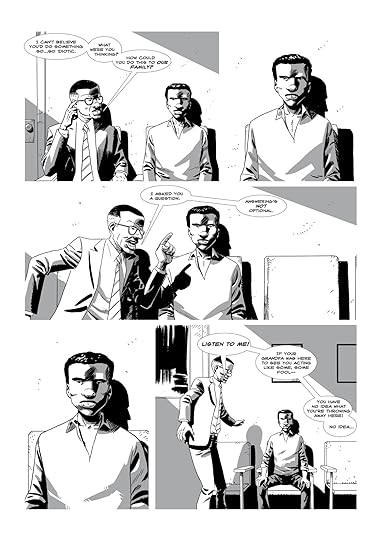
Shortly after my visit with the Don, I set off into new gangster territory: noir fiction. While I loved it all, The Big Sleep most dramatically latched its hooks into me, pulling me out of one world into the next. It awoke in me an awareness of how class and money can influence other people’s stories, and most importantly, my own. Rebirth of the Gangster is just as concerned as Chandler was with exploring how money pulls our strings. Hunter’s story is one of desperation borne out of the puppet master that is American capitalism, a desperation that sets all the crime and violence of this story in motion, which in turn intensifies the family struggles Marcus wades through.
 But this clash between rich and poor doesn’t have to clutch onto the coattails of a private eye, and that’s where 100 Bullets came crashing in. 100 Bullets is one of the finest examples of neo-noir, of fiction that updates those same concerns of corruption, wealth, family, and deceit. It pays homage to the crime fiction of the past--most notably in “The Counterfifth Detective”--but it doesn’t shackle itself just to what’s been done before. Similarly, Rebirth of the Gangster hopes to explore the same issues that Chandler and other greats did, but with a tip of the hat instead of wrapping itself in the same trenchcoat of noir past. And just as importantly, 100 Bullets showed me how to take these stories and move them to a new medium, one where images and words are puzzle pieces that need to fit together to create the whole picture and where dialogue often has multiple meanings, especially when placed against an ironic or reinforcing image.
But this clash between rich and poor doesn’t have to clutch onto the coattails of a private eye, and that’s where 100 Bullets came crashing in. 100 Bullets is one of the finest examples of neo-noir, of fiction that updates those same concerns of corruption, wealth, family, and deceit. It pays homage to the crime fiction of the past--most notably in “The Counterfifth Detective”--but it doesn’t shackle itself just to what’s been done before. Similarly, Rebirth of the Gangster hopes to explore the same issues that Chandler and other greats did, but with a tip of the hat instead of wrapping itself in the same trenchcoat of noir past. And just as importantly, 100 Bullets showed me how to take these stories and move them to a new medium, one where images and words are puzzle pieces that need to fit together to create the whole picture and where dialogue often has multiple meanings, especially when placed against an ironic or reinforcing image.
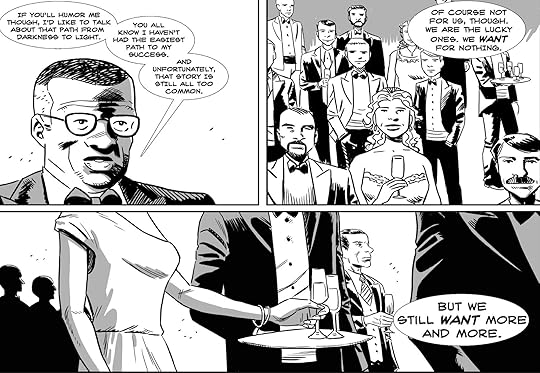 Recently we’ve been living in the Golden Age of TV, and nowhere is that truer than in the genre-defining and genre-busting recent greats like Breaking Bad and The Wire. Breaking Bad showed how an audience can love even the worst character, a character who’s sunk so low that killing children and bringing shame on his family are just means to an end. Now, Walter White didn’t start that way. Vince Gilligan and company showed how a slower pace and a relatable motivation can make the audience root for a character past the point when they’re likeable (sorry Heisenberg fans, but by the end of the show we definitely shouldn’t be rooting for Walt with all he’s done--if you’re mad, though, you’re proving my point about the power of the show).
Recently we’ve been living in the Golden Age of TV, and nowhere is that truer than in the genre-defining and genre-busting recent greats like Breaking Bad and The Wire. Breaking Bad showed how an audience can love even the worst character, a character who’s sunk so low that killing children and bringing shame on his family are just means to an end. Now, Walter White didn’t start that way. Vince Gilligan and company showed how a slower pace and a relatable motivation can make the audience root for a character past the point when they’re likeable (sorry Heisenberg fans, but by the end of the show we definitely shouldn’t be rooting for Walt with all he’s done--if you’re mad, though, you’re proving my point about the power of the show).
And that tactic is exactly what I hope to use in Rebirth of the Gangster--that doesn’t mean Marcus will commit as extreme acts of violence and deceit as Walt does, just that he’s going to follow a similar path of corruption away from model behavior. Plus, similar to Breaking Bad, Marcus has a Jesse to show him the road leading to the kingdom of gangsters. Hunter is this Jesse character, but never to be one without multiple influences, I’ve written him with a hint of an Iago-esque motivation. The comic title Rebirth of the Gangster highlights Marcus’s “birth” as a gangster and descent into darkness; the “Rebirth” part is meant to also emphasize the cyclical nature of this action, hinting at the shadow family legacies throws on Marcus, Hunter and the other characters of this comic.
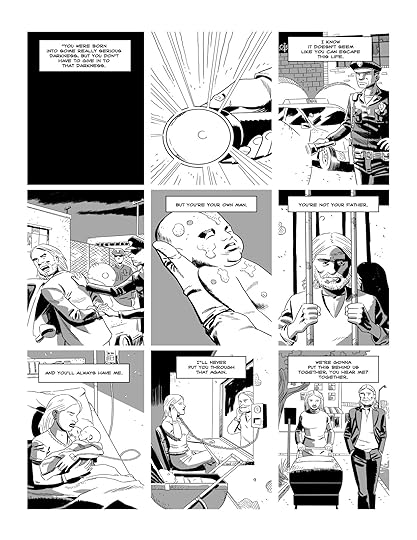
And speaking of other characters, while Rebirth of the Gangster focuses on Marcus at first, its scope has already widened to capture Hunter in the all-seeing camera that is the “narrator” of the comic. Like The Wire, this story tries to capture everybody’s stories (in The Wire Freeman said it best: “All the pieces matter”). And that camera will only continue to rove in future issues--tailing other characters like Detective Lorena Sanchez, Marcus’s mom Linda, Hunter’s mom Andrea, and Dennis, a released inmate trying to walk the straight and narrow. Dennis owes the biggest debt to The Wire, serving as a direct homage to one of my favorite characters, the great Cutty-from-the-Cut, another inmate trying to see where he fits in the game that got him into prison in the first place (and before I get Omar haters on my back, I just want to say that Omar is my favorite character, especially his line “A man got to have a code”, a line that also showcases the idea my comic follows: that everybody is the hero of their own story, guided by their own code.).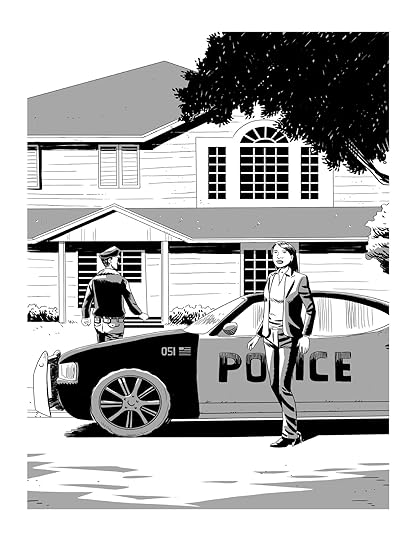
Ultimately, by widening the scope of this comic, not only am I able to create something closer to The Wire, I am able to tie these distinct threads of gangsterdom into a new whole. Without these influences I never would’ve been able to create a comic that’s truly Shakespearean in its depth; Godfatherian in its emphasis on the ties of family; noiresque in its focus on rich and poor in a new light; Heisenbergian in its descent into darkness; and realistic in a scope similar to The Wire. This is a true Rebirth of the Gangster, giving new life to a genre full of classics.
If you’re interested in finding out more about Rebirth of the Gangster,check out these links:
The first two issues for $2.99 (25% off!)
The first issue for $1.99
The second issue for $1.99
NOTE: From now until August 8 The first issue is FREE for KDP members and there is specal bundle pricing available as well.
And if you loved this behind the scenes look, check out “First Shot: The Making of Rebirth of the Gangster--Shining the Light on a Neo-Noir Comic”
 CJ Standal is an author and owner of his own publishing company, CJ Standal Productions. For the last six months he has been writing his self-published comic Rebirth of the Gangster--illustrated by the great Juan Romera--and he has had some journalistic work published in the now defunct Slant. He is obsessed with entertainment in any type of media and genre and has been reading comics since he was eight years old.When he’s not writing, CJ Standal can be found teaching high school English. In order to keep his teaching and writing worlds separate, he uses the pseudonym CJ Standal. As a teacher and author he hopes to spark the same love of reading and stories in the next generation.
CJ Standal is an author and owner of his own publishing company, CJ Standal Productions. For the last six months he has been writing his self-published comic Rebirth of the Gangster--illustrated by the great Juan Romera--and he has had some journalistic work published in the now defunct Slant. He is obsessed with entertainment in any type of media and genre and has been reading comics since he was eight years old.When he’s not writing, CJ Standal can be found teaching high school English. In order to keep his teaching and writing worlds separate, he uses the pseudonym CJ Standal. As a teacher and author he hopes to spark the same love of reading and stories in the next generation.
“The Seeds of Rebirth of the Gangster: Pruning the Comic’s ‘Family Tree’ of Influences”
 My brothers and I huddled in front of the TV, our dad sitting on the couch to save his already deteriorating eyesight the strain; but no matter where we were, all our eyes were glued on the Don.
My brothers and I huddled in front of the TV, our dad sitting on the couch to save his already deteriorating eyesight the strain; but no matter where we were, all our eyes were glued on the Don.
We were in our early to mid-teens, and we were watching that great American classic, The Godfather. And whether I knew it or not, this movie would have a profound effect on me in the coming days, months and years. It’s not just that the movie walks a delicate tightrope between light and darkness, family and self-determination, sympathy and apathy, restraint and violence. And it’s not just that this was one of the few moments where my dad tossed his work obligations out of sight for a rare moment of bonding with his sons. No, it wasn’t any of those things that forged this into that nugget of gold shining in the murk of memory. What gave this movie its luster was that it sparked a desire that would never be satisfied, that could never find enough fuel for its flame: a desire that eventually launched me onto the path of writing Rebirth of the Gangster, my gangster greed so great that I wasn’t going to be satisfied until I was able navigate those dark waters myself.
 Aside from the obvious debt, Rebirth of the Gangster owes much more to gangster classics new and old than I’m willing to admit, classics like The Godfather, The Big Sleep, 100 Bullets, Breaking Bad, and The Wire. But--history student that I am--I realize that sometimes the only way to move forward is to look back.
Aside from the obvious debt, Rebirth of the Gangster owes much more to gangster classics new and old than I’m willing to admit, classics like The Godfather, The Big Sleep, 100 Bullets, Breaking Bad, and The Wire. But--history student that I am--I realize that sometimes the only way to move forward is to look back. And speaking of looking back: that struggle between tradition and innovation--between loyalty and independence--is probably the biggest thread I pulled out of The Godfather when I was weaving the tapestry of Rebirth of the Gangster. In The Godfather, Michael Corleone returns home after trying to escape his family’s hold, and reluctantly grabs the reins of The Family, hoping to steer it into a new world of light instead of darkness, of legitimacy instead of lawlessness. This same struggle opens Rebirth of the Gangster and frames Marcus’s whole journey throughout the comic.

Can Marcus escape the death surrounding his family’s past? Will he give in to his dad’s obsession with image and responsibility, an obsession born out of his dad’s desire to hide the shadows of the past? Or will he repeat the same mistakes of his dad, backsliding into darkness, ironically because of his father’s impulse to keep him in the dark? Replace Marcus with Michael in those previous questions, and I could just as easily be describing Coppola’s masterpiece.

Shortly after my visit with the Don, I set off into new gangster territory: noir fiction. While I loved it all, The Big Sleep most dramatically latched its hooks into me, pulling me out of one world into the next. It awoke in me an awareness of how class and money can influence other people’s stories, and most importantly, my own. Rebirth of the Gangster is just as concerned as Chandler was with exploring how money pulls our strings. Hunter’s story is one of desperation borne out of the puppet master that is American capitalism, a desperation that sets all the crime and violence of this story in motion, which in turn intensifies the family struggles Marcus wades through.
 But this clash between rich and poor doesn’t have to clutch onto the coattails of a private eye, and that’s where 100 Bullets came crashing in. 100 Bullets is one of the finest examples of neo-noir, of fiction that updates those same concerns of corruption, wealth, family, and deceit. It pays homage to the crime fiction of the past--most notably in “The Counterfifth Detective”--but it doesn’t shackle itself just to what’s been done before. Similarly, Rebirth of the Gangster hopes to explore the same issues that Chandler and other greats did, but with a tip of the hat instead of wrapping itself in the same trenchcoat of noir past. And just as importantly, 100 Bullets showed me how to take these stories and move them to a new medium, one where images and words are puzzle pieces that need to fit together to create the whole picture and where dialogue often has multiple meanings, especially when placed against an ironic or reinforcing image.
But this clash between rich and poor doesn’t have to clutch onto the coattails of a private eye, and that’s where 100 Bullets came crashing in. 100 Bullets is one of the finest examples of neo-noir, of fiction that updates those same concerns of corruption, wealth, family, and deceit. It pays homage to the crime fiction of the past--most notably in “The Counterfifth Detective”--but it doesn’t shackle itself just to what’s been done before. Similarly, Rebirth of the Gangster hopes to explore the same issues that Chandler and other greats did, but with a tip of the hat instead of wrapping itself in the same trenchcoat of noir past. And just as importantly, 100 Bullets showed me how to take these stories and move them to a new medium, one where images and words are puzzle pieces that need to fit together to create the whole picture and where dialogue often has multiple meanings, especially when placed against an ironic or reinforcing image.
 Recently we’ve been living in the Golden Age of TV, and nowhere is that truer than in the genre-defining and genre-busting recent greats like Breaking Bad and The Wire. Breaking Bad showed how an audience can love even the worst character, a character who’s sunk so low that killing children and bringing shame on his family are just means to an end. Now, Walter White didn’t start that way. Vince Gilligan and company showed how a slower pace and a relatable motivation can make the audience root for a character past the point when they’re likeable (sorry Heisenberg fans, but by the end of the show we definitely shouldn’t be rooting for Walt with all he’s done--if you’re mad, though, you’re proving my point about the power of the show).
Recently we’ve been living in the Golden Age of TV, and nowhere is that truer than in the genre-defining and genre-busting recent greats like Breaking Bad and The Wire. Breaking Bad showed how an audience can love even the worst character, a character who’s sunk so low that killing children and bringing shame on his family are just means to an end. Now, Walter White didn’t start that way. Vince Gilligan and company showed how a slower pace and a relatable motivation can make the audience root for a character past the point when they’re likeable (sorry Heisenberg fans, but by the end of the show we definitely shouldn’t be rooting for Walt with all he’s done--if you’re mad, though, you’re proving my point about the power of the show).
And that tactic is exactly what I hope to use in Rebirth of the Gangster--that doesn’t mean Marcus will commit as extreme acts of violence and deceit as Walt does, just that he’s going to follow a similar path of corruption away from model behavior. Plus, similar to Breaking Bad, Marcus has a Jesse to show him the road leading to the kingdom of gangsters. Hunter is this Jesse character, but never to be one without multiple influences, I’ve written him with a hint of an Iago-esque motivation. The comic title Rebirth of the Gangster highlights Marcus’s “birth” as a gangster and descent into darkness; the “Rebirth” part is meant to also emphasize the cyclical nature of this action, hinting at the shadow family legacies throws on Marcus, Hunter and the other characters of this comic.

And speaking of other characters, while Rebirth of the Gangster focuses on Marcus at first, its scope has already widened to capture Hunter in the all-seeing camera that is the “narrator” of the comic. Like The Wire, this story tries to capture everybody’s stories (in The Wire Freeman said it best: “All the pieces matter”). And that camera will only continue to rove in future issues--tailing other characters like Detective Lorena Sanchez, Marcus’s mom Linda, Hunter’s mom Andrea, and Dennis, a released inmate trying to walk the straight and narrow. Dennis owes the biggest debt to The Wire, serving as a direct homage to one of my favorite characters, the great Cutty-from-the-Cut, another inmate trying to see where he fits in the game that got him into prison in the first place (and before I get Omar haters on my back, I just want to say that Omar is my favorite character, especially his line “A man got to have a code”, a line that also showcases the idea my comic follows: that everybody is the hero of their own story, guided by their own code.).

Ultimately, by widening the scope of this comic, not only am I able to create something closer to The Wire, I am able to tie these distinct threads of gangsterdom into a new whole. Without these influences I never would’ve been able to create a comic that’s truly Shakespearean in its depth; Godfatherian in its emphasis on the ties of family; noiresque in its focus on rich and poor in a new light; Heisenbergian in its descent into darkness; and realistic in a scope similar to The Wire. This is a true Rebirth of the Gangster, giving new life to a genre full of classics.
If you’re interested in finding out more about Rebirth of the Gangster,check out these links:
The first two issues for $2.99 (25% off!)
The first issue for $1.99
The second issue for $1.99
NOTE: From now until August 8 The first issue is FREE for KDP members and there is specal bundle pricing available as well.
And if you loved this behind the scenes look, check out “First Shot: The Making of Rebirth of the Gangster--Shining the Light on a Neo-Noir Comic”
Published on August 06, 2016 08:00
August 3, 2016
Author Interview: E. W. Sullivan (Sully) Author of Swarm Theory
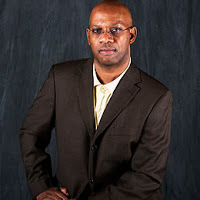 Award winning author E. W. Sullivan (Sully) was born in Jacksonville, Florida. He worked as an architect and contractor, taught computer networking, and owned a financial services company before becoming an author. Sheaves of Zion was Sullivan's first novel and Readers' Favorite 2013 bronze medal winner for fiction-mystery-sleuth. His second novel, Swarm Theory, is the second book in the Thelonious Zones crime series. He credits his high school English teacher, Mr. Smith, for planting the seed for his love of writing, his late father for how to tell a great story and his late mother for how to curse properly. E.W. Sullivan lives, works and writes in Atlanta, Georgia with his wife Anita and daughter Paris.
Award winning author E. W. Sullivan (Sully) was born in Jacksonville, Florida. He worked as an architect and contractor, taught computer networking, and owned a financial services company before becoming an author. Sheaves of Zion was Sullivan's first novel and Readers' Favorite 2013 bronze medal winner for fiction-mystery-sleuth. His second novel, Swarm Theory, is the second book in the Thelonious Zones crime series. He credits his high school English teacher, Mr. Smith, for planting the seed for his love of writing, his late father for how to tell a great story and his late mother for how to curse properly. E.W. Sullivan lives, works and writes in Atlanta, Georgia with his wife Anita and daughter Paris.Swarm Theory: A Murder Mystery-ThrillerWho are your influences?My literary influences are many and they span both time and genre. Richard Wright and James Baldwin first showed me the impact a good story could have. JD Salinger brought out the rebel in my writing. More contemporary are Walter Mosley and George Pelecanos whose crime fiction is some of the best I’ve ever read. When did you begin writing?I became serious about a writing career ten years ago. It was either stay in corporate America and eat steak or pursue my passion to write and eat bad Chinese takeout. The former won out for another seven years (the heart was willing, but the stomach staged a coup d’etat). I’ve been seriously writing for the last three years. How do you come up with your stories, characters, character names, POV, etc?As a crime mystery writer, coming up with the stories is easy – death and destruction are all around. The trick is making it seem fresh. For example, my newest novel, Swarm Theory, deals with bombs and terrorist – nothing new, right. But then throw in cutting edge science and corrupt institutions and you got a story with some interesting angles. As for my characters, I draw on a wealth of both street and classroom knowledge. A minor character from the novel whose nickname is “Car Wreck” comes from someone I knew as a child. Professor Landrosky, a character also from the book, has mannerisms of my college professor. So, for me, real life experiences play a major role in story and character development. Do you work from an outline?Yes! And the more detailed the better. I’ve tried the pantser route with little success. I like the structure an outline gives me. It allows me to think ahead as to how a chapter, plot, character, etc. will be developed. It also keeps me from writing myself into a hole. The outline, for me, is a road map (or GPS) that keeps me from getting lost.Criminal profiler Dr. Thelonious Zones wants to believe his father didn’t kill his mother. What stops him from believing is the twenty-five years to life he received for her murder. Zones’ avuncular employer and father’s best friend, Sam Drake, defends his innocence. Zones sets out to find the truth to this twenty-four year old question, but his search is interrupted when he is forced to investigate the death of a young Arab college student and the series of bombings engulfing a small southern town. Zones’ theory and profile of the perpetrator(s) are questioned by law enforcement when events change and new suspects emerge. The trail to the truth will lead Zones through a thicket of well-guarded secrets and childhood memories that cause him to question what he believes about how the world truly works.
Tell me about your favorite scene in your novel.No self-respecting novelist would have just one. But if I must, I’ll have to say that my favorite scene in the book is “The Hack”, Chapter Forty-nine. It has all the elements of a great scene: action, tension, dialogue, foreshadowing, etc. The strange thing is that there’re no fight scenes, no car chases, and no gun fights. Yet, the scene is weighty. The dialogue between Zones and Stats is some of the best in the book. There are other scenes with better elements, but as a representative of the whole, “The Hack” is perhaps the best.
Can you tell us a little about your writing philosophy?Soapbox time! I have the same philosophy about writing as I do about music. If a song doesn’t edify the listener – provoke thought, action or emotion – then it is noise. One of my favorite Bible verses is I Corinthians 13:1 which says, “Though I speak with the tongues of men and of angels, and have not charity, I am become as sounding brass, or a tinkling cymbal.” Let’s be clear, I write murder-mystery thrillers. The genre doesn’t lend itself to producing a, To Kill a Mockingbird. But that doesn’t mean it should be devoid of thought-provoking subject matter. Early Rap music was a social commentary on the plight and struggles of a people that raised the art form from an underground lyrical competition to that of a musical vehicle to air grievances and bring about societal change. In the wrong hands, as we now see, it has, “…become as…a tinkling cymbal”. Whether you are a poor writer or a great one, edify the reader. If at the end of reading my latest novel (Swarm Theory) the reader goes, “Hmmmmm?”, them I’ve done my job. Have you ever tried writing in any other genres?Yes. In fact, I’m reworking an early novella titled The Red Heifer. I’ll describe it as an adventure story with religious overtones. It is, to me, some of my best writing and storytelling. I hope to finish the revisions soon. Stay tuned. I’m also in the idea stage of a contemporary piece that revolves around the life of a young, black man from a North Carolina sharecropping family during reconstruction. It’ll be loosely based on stories my father told me about his early life growing up in the Jim Crow South.
Do you have any interesting writing-related anecdotes to share?It was my freshman year of Humanities 101 at a small community college (they were called junior colleges back then). The professor, a diminutive, bespectacled older woman, assigned the class to write a one page report on a contemporary topic of our choosing. My subject matter escapes me, but what I do remember is that I labored over the assignment for many days, to make sure everything was perfect – it was. Days later, after grading the papers, the professor held me after class. “Mr. Sullivan,” she said, holding the folded paper in her hand, “this paper is perfect, no spelling or grammatical errors.” I recall feeling a slight smile spread across my face. She looked up at me from behind her glasses. Although I had no proof of it, something told me she had once been a nun, despite the wedding band around her ring finger. “Are you sure you wrote this?” She squinted her eyes like my mother when she didn’t believe the lie I had just told her. My mother, however, knew me like she knew the lyrics to her favorite gospel hymn, the one she sang every morning around the house. This woman knew nothing about me. I was just one of many faces passing before her every day. In that one instant, the smile my face donned had been wiped away. I remember being puzzled. I did write this paper. I have the crumpled drafts littering my bedroom floor to prove it. I stood there, towering over her, but she held the high ground. “That’s my work. I wrote it,” I said through a nervous smile. She shoved the paper at me. “It’s boring though. You have a good day, Mr. Sullivan.” She returned to her work and I turned tail, bolting for the door. Outside the classroom, I unfolded the paper. Marked in red at the top of it was a big, fat ‘A-’. An ‘A’ minus for a perfect paper, I thought. I also thought, bitch (sorry ladies, I was young at the time). I left school that day feeling that my integrity had been assailed. It was not a good feeling. I finished her class doing well but feeling untrustworthy.
I learned a few things from that experience that stay with me to this day. People don’t trust perfection because they know that there is no such thing. So, when they see it, there’s an automatic distrust of it. It’s why we like our protagonist flawed. We love flawed characters. Saints rarely make a second book. Another thing I learned from this experience is that your readers must trust you as an author. Better yet, they must trust your work. Imperfection is okay (that’s what editors are for). I write imperfectly to this day. I make my editor earn his or her money. You want to deliver a polished product to the reader, but they expect some imperfection, just not the glaring subject-verb not in agreement type. Finally, a perfectly written, boring story in publishing is called an abstract. So, unless it’s written for an academic journal and the like, readers expect to be entertained. I wasn’t sure if the half point deduction I received from my professor was for her believing that I had plagiarized the paper or for its lack of entertainment value. Either way, I had failed in gaining her trust and in keeping her interest.
Social Media Links
www.ewsullivan.comtwitter.com: @ewsulliFacebook
Published on August 03, 2016 08:00
July 25, 2016
Author Interview: Lisa Gordon, Author of A Sealed Fate
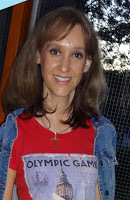 Lisa is the winner of the 9th American Gem Novel Writing Contest 2012/2013.Lisa also scooped 4th prize with another novel.Lisa received an honourable mention for her play Holly Leaves in the Writers Digest Annual Awards.
Lisa is the winner of the 9th American Gem Novel Writing Contest 2012/2013.Lisa also scooped 4th prize with another novel.Lisa received an honourable mention for her play Holly Leaves in the Writers Digest Annual Awards.Lisa Jacqueline Gordon was born and brought up in in Johannesburg. She studied BCom Law at Witwatersrand University before going to the UK to complete a BSc. Industrial Economics Hons. She now lives in the UK countryside. Lisa studied with the Faculty of Astrological Studies in London and later became a regular guest on BBC WM and BBC Shropshire doing to monthly stars and forecasts for the Birmingham footie teams. Lisa has guested on BBC Coventry and Warks, BBC Cambridge, BBC Northants, TalkSport and Fox FM. Lisa also campaigns against injustice and unfair trials abroad.
A Sealed Fate
A chain of tragic deaths across Dubai spanning two decades, only Valda knows they were not accidents, but murders. Her name is next on that list. Spunky singer Valda ditches her old life in Cape Town for a new start in glittering Dubai. Armed with just her cigarettes and some attitude she sets about reigniting her career and putting to bed the heartache over her former boyfriend Richard.
Valda does indeed find success and to her astonishment love, but all is threatened when she is introduced to a billionaire Sheikh. Her clandestine liaison with the Sheikh, propels her into a murky web of deceit and when newspaper clippings of seemingly accidental deaths across Dubai are posted anonymously to her it is clear she is rushing headlong into the same fate. No one dare cross the Sheikh and she can hardly hardly turn to the law, so with few options open she confides in Larissa. As an astrologer, Larissa predicts that Valda and the Sheikh's destinies were sealed from the moment of their first meeting; however she keeps the dire fate that she reads in the charts a secret. Lara resolves to help Valda flee Dubai and the ever tightening grip of the Sheikh; but should Valda be putting all her faith in her new friend and guru of the grimoires.
Together, Valda and Larissa take a gamble in a game of cosmic Russian Roulette where the stakes are their lives and their adversary, Fate itself.A thoroughly modern cocktail of intrigue, passion and suspense set against the exotic locales of Cape Town and Dubai with an eclectic mix of characters, a perfect beverage if you like a tangy lemon peel in your drink as this one has a twist at the end too, but you'll have to read it to discover it.
Who are your influences?I always enjoyed Sidney Sheldon and I loved the way every one of his books was slightly different; there was no formula and like me, he did not rely on a cop or detective as a main character and books were story more than body count/evidence lead.
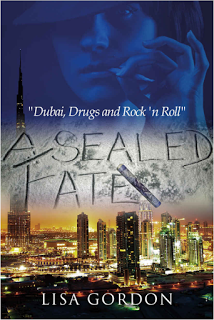 Sheldon had strong female characters who were never whiter than white - I steer clear of books which take a good versus evil stance. We can all be good and evil according to what we are faced with.I love Robert Ludlum as I think his plots are complex and exiting and I love the conspiracy angles.
Sheldon had strong female characters who were never whiter than white - I steer clear of books which take a good versus evil stance. We can all be good and evil according to what we are faced with.I love Robert Ludlum as I think his plots are complex and exiting and I love the conspiracy angles.When did you begin writing? It was right after I had a tarot reading and the psychic said, "Do you know you are a very good writer." I had never thought of writing before, in fact I was studying accounting and yearning to be an actress.Writing was actually my saviour as it came at a time when I needed a direction and a goal I cared about. I started writing A Sealed Fateright away and was amazed when I found myself nine chapters in - it came so naturally and suddenly I realised that this was way better than acting as it was my own words, I was not just speaking someone else's.My grandfather passed away, leaving a huge gap in my life as he had been like my father and I stopped writing for a few months, but I soon began again as he had said how happy he was for me to follow a career as an author as he knew I would do well at it.
How do you come up with your stories, characters, character names, POV, etc?I tend to write from inspiration I get an idea and go with it; it was only after I had some publishing experts read over A Sealed Fate that I saw where I had gone wrong in terms of mixing genres and not getting the pace right. A Sealed Fate is more a story than a thriller per se as it is not packed with bodies, detectives and forensic detail. I find I need to love my main character. Valda is a lot like me, expect where I tend to be a people pleaser she is the more wild side of me and so writing about her allowed me to access another part of my personality. So if the main character is a little like you or someone you care about that is a big help.I chose Dubai as a locale as I had been there on a short trip and I felt it made a good backdrop for the story - it does help if you know your location well and feel it contributes to the story.It helps to have a premise you want to explore: In A Sealed Fate it was fate versus freewill; which is more powerful; in Next of Sin it was Blood is NOT thicker than water and in Not Guilty Not Innocent it was Not Guilty does not mean innocent. I always stay with things I know and are interested in - for me it is psychology/philosophy (human nature) and also law..but there are many other subtle literary elements that I seem to throw in.I like original characters that are non PC or a little eccentric.Valda was a character in a girl's comic called Mandy, that I read when I was 8-10. It means spirited warrior. I choose names I like and sometimes names of kids I knew at school and liked.I try to go for less cliched names. Names are often age and era specific ie who under 30 is called Sheila, Pam or Carol, those names are my Mom's era. Names like Chantelle, Sophie, Chloe are very popular in the UK for under 30's. In my era it was Lisa, Jackie, Nicki, Debbie, Michelle - names go in cycles and so I think you should think of which names were trendy in which decade and match the characters age. In the UK: Catherine, Fiona, Phillipa and Caroline are seen as POSH names - so I think as well about which names come over as posh or more down to earth.Clinton was my first boyfriend. Brett and Richard were names that I thought sounded cool.
Do you work from an outline?I have a basic plot and outline of main events mapped out, but I find that sub plots, twists and new characters emerge as if by magic as I write. I don't plan things in too much detail, I just get stuck right it. I worked on the plot in my head at night and I wrote when I should have been studying for my audit exam. I guess when the alternative is audit, you'll do anything including scrub an oven. I am not even a big reader, I am however very imaginative and making up stories in my head was always the way I dealt with worry, hurt, disappointment and stress all throughout my life from the age of 4. So the plotting was great fun and the main character was one I felt very attached to and so I relished the writing process.
Tell me about your favorite scene in your novel.In A Sealed Fate my favourite scene was right at the end...but can I say what it is without revealing the plot.
Can you tell us a little about your writing philosophy?Write for love!!
Have you ever tried writing in any other genres?I have written chicklit and I write astrology books and also alternate health books. I am passionate about a number of issues and enjoy writing about these subjects too.I want to write loads more in the thriller genre, as that is where my heart is.
Do you have any interesting writing-related anecdotes to share?When I wrote my first book I was so excited when it arrived at the book store that I told all my friends at my tennis club about it. Of course I was hoping they would rush along and buy copies. Next week when I saw them again they all said the same thing, "We went to the bookstore in town and we looked at your book."
And I was thinking, "What? It's a book you buy it, you don't visit it like a sick patient in hospital?"
~#~
Lisa's website is lisalazuli.wix.com/lisajgordon, and her books, A Sealed Fate and Next of Sin are available on Amazon.
Published on July 25, 2016 23:20
July 19, 2016
Author Interview: A.M. Rycroft, Author of The Taming
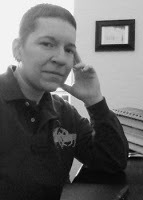 A.M. Rycroft is a dark fantasy and horror writer, and blogger. She lives in Pittsburgh, PA, and holds a B.A. in English from the University of Pittsburgh.She has been writing since a young age, and though she attended art school for a time, she found her way back to writing again after art school. Her first dark fantasy/horror novel Into the Darkness was written while she attended the University of Pittsburgh. Her writing has been compared to the works of David Eddings and Stephen King.
A.M. Rycroft is a dark fantasy and horror writer, and blogger. She lives in Pittsburgh, PA, and holds a B.A. in English from the University of Pittsburgh.She has been writing since a young age, and though she attended art school for a time, she found her way back to writing again after art school. Her first dark fantasy/horror novel Into the Darkness was written while she attended the University of Pittsburgh. Her writing has been compared to the works of David Eddings and Stephen King.When she is not writing, Rycroft is a writing coach and a periodic cartoonist. She enjoys keeping fit with weight training and walks through her local parks. During the summer, A.M. is frequently seen riding the roller coasters at the Kennywood amusement park.
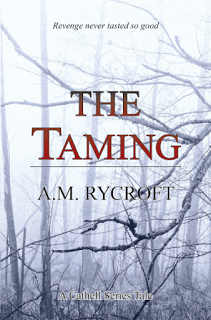
The Taming
Imps, ale, and intrigue… This dark fantasy tale follows the brash Thystle Moran, sword for hire. Only one job has ever bothered her, one that promised to be easy money, but ended in the death of her friend. Now, an imp with questionable motives says her friend's death was no accident. Thystle seeks retribution as her world spirals out of control. She faces off against her dark past, a betrayal, feelings for a young woman, and the interests of a shadowy group known only as the Immortals. Can she ever catch a break?
Who are your influences?Stephen King, Neil Gaiman, and Joe Hill are my biggest influences, and to a smaller degree George R.R. Martin.
When did you begin writing?I've been writing since I was very young. I didn't really decide on writing as a career path until after high school and a brief stint at art school. When I went back to school at Pitt, that's when I really started to focus on my writing.
How do you come up with your stories, characters, character names, POV, etc?I get my story ideas from a variety of places - dreams, a piece of a song, something I overhear in passing - but it usually starts with a character with a story to tell, rather than just a plot.
My characters speak to me in a variety of ways, usually in the form of a dialog snippet or a series of scenes. If a new character doesn't tell me their name, I either just make up a name, or I might go through a baby name book to get an idea.
As for POV, I rarely stray outside of the close 3rd person, simply because I like to maintain that observer status. I do have a couple of very short pieces (unpublished) from the 1st person POV, though.
Do you work from an outline?I never outline. I might make notes about an upcoming scene if I don't have the time to write the scene when it comes to me, but I am 100% a let-it-flow writer. I know outlining works well for some, but I just find it restraining.
Tell me about your favorite scene in your novel.That's a hard thing to choose! I would have to say that my favorite scene in The Taming has to be the final fight scene, because it's a little off the wall, has some humor, and is 100% Thystle from beginning to end. She's such a fun character to write.
Can you tell us a little about your writing philosophy?Listen to the characters. They, like people in real life, have a story they want to tell. I stay true to that story, without adding my own influences, even when I don't necessarily like how they react to something or the path I take. When I do that, my characters take me to fantastic places that really resonate with my readers, so I always hold onto the philosophy that the character is king.
Have you ever tried writing in any other genres?I have written fantasy, horror, sci-fi, weird fiction, and some thriller-type stories. Fantasy and horror are my main focus, but no genre is really closed off to me in my mind, except perhaps for romance. Even though I might add romantic elements to my stories, writing a straight-up romance just isn't my thing.
Do you have any interesting writing-related anecdotes to share? Sure. I met Joe Hill in Massachusetts at a horror book fest kind of a thing last year. It was at a point where I was feeling a little low about my writing, because my first book hadn't seen much traction with readers. I took the plunge and asked for his advice. He thought about it and then said, "Look, it took me 10 years to get where I am now. Success in writing is a long term thing." He told me that given enough time, one of my books will catch fire and that in the meantime, I should just keep writing for the love of writing. I was really touched with the way he told me to hang on, you'll get there. Now, I don't worry as much about whether what I'm writing is the next "hit" or not. I'm writing, because that's what I love to do.
ExcerptThe wind felt colder now. She glanced around the dirty, refuse-littered alley. A bad feeling wormed its way into her gut and warned Thystle that she had missed the signs that she was walking into a trap.“Perhaps you should tell me exactly what I’m doing here, imp, before I spread your insides across this dank alley,” she replied in a careful tone.Jalus shook his head at her. “Consider that a bad idea, my dear. My employers know where I am, and there is a dwarf with a short temper inside the shop behind me who might take my death personally.”Thystle opened her mouth to respond to this, but Jalus held up a hand to forestall further threats. “I will not waste your time. I brought you here because there is a man recently returned to Haven who presents a threat to the nonhumans in this town. He means to do away with the likes of you first, and there is little doubt in my employers’ minds that this reckoning will not stop with vampyres. He also happens to be responsible for the death of your friend Jonathan Revner, the younger Revner.”His note misled her indeed. The information Jalus possessed was nothing like the information she thought he would bring her, or even about whom she thought. Thystle shook her head, trying to understand what he told her, and thought back to a morning a year ago that still haunted her dreams. She wondered how someone could be responsible for what had happened.“What are you saying to me?” Thystle questioned Jalus, her voice low.The imp laughed at her. “Surely, you did not think your friend got that way on his own, did you? You thought how you found him was an accident?”
A.M Rycroft's book news sign-up: http://eepurl.com/b8JUIvA.M Rycroft's site: www.writinginadarkroom.comTwitter: https;//twitter.com/amrycroftwriterFacebook: https://www.facebook.com/amrycroftwriterGoodreads: https://www.goodreads.com/author/show/13908880.A_M_Rycroft
Published on July 19, 2016 05:00
July 12, 2016
Author Interview: John Murray: Author of Code Name: Papa - My Extraordinary Life While Hiding in Plain Sight
(For the sake of their own safety and that of their loved ones, the writers have chosen to move forward in revealing this story under aliases.)
John Murray: A Vietnam vet, John Murray, later known as ”Papa,” has spent the majority of his adult life working as an undercover agent for the U.S., Canadian and various European governments. During this time, he rose from agent to the head of US Operations.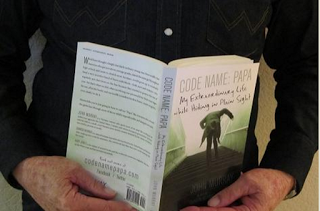 John was raised in the South by his grandfather who taught him at an early age how to survive by hunting and fishing, which all served him well for his future. He firmly believes that if he had not had the guidance of his grandfather and others who influenced his life that he never would have survived the ordeals that he did.
John, who enjoyed a very average American childhood, always wanted to be a ‘normal’ husband and father, but you’ll eventually understand why that was impossible.
Papa and his crews bore the responsibility of taking care of much of the world’s evil – evil that could never have come to the public’s attention.
Now retired, he and his wife are living in a small rural Western town. As ‘normal’ as he tries to live, he will always be haunted by the visions of what he saw and what he tried to prevent or rectify.
John was raised in the South by his grandfather who taught him at an early age how to survive by hunting and fishing, which all served him well for his future. He firmly believes that if he had not had the guidance of his grandfather and others who influenced his life that he never would have survived the ordeals that he did.
John, who enjoyed a very average American childhood, always wanted to be a ‘normal’ husband and father, but you’ll eventually understand why that was impossible.
Papa and his crews bore the responsibility of taking care of much of the world’s evil – evil that could never have come to the public’s attention.
Now retired, he and his wife are living in a small rural Western town. As ‘normal’ as he tries to live, he will always be haunted by the visions of what he saw and what he tried to prevent or rectify.
Sharon Murray: Sharon is a retired business executive who has lived in many parts of the US and in Asia. Happily married to John for over five years, she had no idea about his work until she experienced his nightmares about the past. After discussions about how she might help John, he asked Sharon to help him write his memoirs just as something to leave behind, unpublished. After several years of working on them, Sharon convinced John it was a story worth telling to the world. Working on this project has helped John start to face some of the things he experienced while trying to be a good guy in a world gone awry.
Abby Jones: This is Jones’ fifth book. She also writes for numerous magazines. The original manuscript was handed off to Abby, a friend of Sharon, who has a reputation for her easy, conversational writing style. Abby worked with John and Sharon for approximately eighteen months to make sure John’s voice was never lost in the rewrites. She notes that both John and Sharon were wonderful to collaborate with via phone, computer and text. By the way, she has never met John! Abby currently lives on the West Coast. She has traveled extensively and lived in many other parts of the US as well as in Europe.
After a lifetime of working for a secret international group, John Murray finally reveals his journey with the help of his wife, Sharon, and co-writer Abby. His memoir, Code Name: Papa – My Extraordinary Life While Hiding in Plain Sight, details his time within an organization that, while not connected to the US government, operated with the full blessing of top people in our government. “With this book, I hope to educate the public and open up the conversation about what our country and others have really done on dangerous secret missions to help the world,” says John Murray (Papa), who deftly tells his fascinating and memorable life story, laying out facts but leaving it to readers to determine how they feel about each mission. The highlighted missions include the deaths of eight counter covert operators in a major Las Vegas hotel conference room during a mission that has “stayed in Vegas” until now; a European mission to save sex slaves from major drug dealers; a successful all-out effort to save a small European country from takeover, and much more. These are real stories, gritty and true—not the fantasy world of James Bond, Scandal, and others.
How long have you been considering turning your adventures into a memoir?Quite honestly, I never considered doing this. But, years after these missions were over, I continued to have nightmares and night sweats that scared Sharon, my wife of seven years. She convinced me to tell her the stories and she’d write them down – then we could put them away. So, I decided to do that. She was shocked about my past life, but wanted me to share my life’s work with the world. She ran the first chapter or two by a writer friend, Abby Jones. It was apparent from the start that we’d make a great team to write and edit together. After eighteen long months, we had a manuscript. Now we’re finally starting to work on book # 2 of this planned trilogy.
Did you have to vet any part of your story through any government agencies?Well yes, depending on the 'job' that I had to do. Regarding what country we had to work in, out of courtesy the United States government was always in the loop and gave us abilities to land at military bases and much more. However, I had great leeway in what was done and the final say on choosing not to take on a mission.
I know that sometimes – for the sake of expediency – several real individuals in a memoir might be bundled into one character or time might be dilated. Is there any of this in your story? No, never. One of the most important things in writing this book was to honor the hard work and many sacrifices of my team members – many of whom I worked with for decades. Our readers really become attached to these wonderful, crazy, self-sacrificing people! The other important thing was to tell our readers what really happens out there. I enjoy James Bond and other spy stories, but they are so far from the tough reality of the lives we lived! No tuxedos, no champagne, just plain old-fashioned hard work!
Is any portion of the story fictionalized and if so how much would you estimate that is?The times and places were sometime changed to a different area to protect not only ourselves but also to protect people/countries that were involved. Yet, some of our mission locations were impossible to change, including the UK where many local citizens suspected seeing a UFO. Also Las Vegas. As we now say, years after that amazing mission, what happened in Las Vegas is no longer staying there!
Which locations in your missions did you enjoy the most and which the least and why?The only thing that I truly enjoyed was when I got my crew and myself home safely. Though so many of our missions were difficult to handle psychologically, the one that disturbs me the most was the Russian women who were sex slaves and were murdered by the time we got to them. Towing all those empty boats back to our ship was incredibly difficult. But, many of our other missions were hard to shake off as well. It definitely took its toll on all of us, on our marriages, and on our children – none of whom could know what we really did for a living.
Now that the writing bug has bitten, will you be writing any straight fiction?Absolutely not!!! (laughing) I have complete admiration for people who write great fiction, so I’m going to leave that job to the experts.
If they ever make your book into a movie, who should play the character of Papa?I think Matthew McConaughy would be perfect. If not him, it would have to be someone who would come across as strong and steady, who talked things out clearly – not a James Bond type. Gary Sinese also comes to mind, as does Woody Harrelson. It could be a great and varied roll for someone to take on. Surprisingly, my story regularly gets compared to both the TV show “Scandal” and to Navy S.E.A.L.’s Chris Kyle’s story, “American Sniper”. I appreciate the compliments, but my story is very different.
Code Name: Papa—My Extraordinary Life while Hiding in Plain Sight is the first in a planned trilogy. John, Sharon, and Abby are currently working on the second book, about Papa’s mentor, Amy.
To learn more, go to: | Facebook | | | Amazon
John Murray: A Vietnam vet, John Murray, later known as ”Papa,” has spent the majority of his adult life working as an undercover agent for the U.S., Canadian and various European governments. During this time, he rose from agent to the head of US Operations.
 John was raised in the South by his grandfather who taught him at an early age how to survive by hunting and fishing, which all served him well for his future. He firmly believes that if he had not had the guidance of his grandfather and others who influenced his life that he never would have survived the ordeals that he did.
John, who enjoyed a very average American childhood, always wanted to be a ‘normal’ husband and father, but you’ll eventually understand why that was impossible.
Papa and his crews bore the responsibility of taking care of much of the world’s evil – evil that could never have come to the public’s attention.
Now retired, he and his wife are living in a small rural Western town. As ‘normal’ as he tries to live, he will always be haunted by the visions of what he saw and what he tried to prevent or rectify.
John was raised in the South by his grandfather who taught him at an early age how to survive by hunting and fishing, which all served him well for his future. He firmly believes that if he had not had the guidance of his grandfather and others who influenced his life that he never would have survived the ordeals that he did.
John, who enjoyed a very average American childhood, always wanted to be a ‘normal’ husband and father, but you’ll eventually understand why that was impossible.
Papa and his crews bore the responsibility of taking care of much of the world’s evil – evil that could never have come to the public’s attention.
Now retired, he and his wife are living in a small rural Western town. As ‘normal’ as he tries to live, he will always be haunted by the visions of what he saw and what he tried to prevent or rectify. Sharon Murray: Sharon is a retired business executive who has lived in many parts of the US and in Asia. Happily married to John for over five years, she had no idea about his work until she experienced his nightmares about the past. After discussions about how she might help John, he asked Sharon to help him write his memoirs just as something to leave behind, unpublished. After several years of working on them, Sharon convinced John it was a story worth telling to the world. Working on this project has helped John start to face some of the things he experienced while trying to be a good guy in a world gone awry.
Abby Jones: This is Jones’ fifth book. She also writes for numerous magazines. The original manuscript was handed off to Abby, a friend of Sharon, who has a reputation for her easy, conversational writing style. Abby worked with John and Sharon for approximately eighteen months to make sure John’s voice was never lost in the rewrites. She notes that both John and Sharon were wonderful to collaborate with via phone, computer and text. By the way, she has never met John! Abby currently lives on the West Coast. She has traveled extensively and lived in many other parts of the US as well as in Europe.
DescriptionWho’d have thought a bright, but fairly ordinary young man from middle class America who got just above average grades, dated the same girl throughout high school and went to church most Sundays, would grow up to eventually head a very secretive band of brave individuals-- both men and women-- who regularly put their lives on the line because they wanted to protect the rest of you. Yet that;s what we did, often sacrificing our personal lives (four marriages for me, all in the book) and our health (countless broken bones, major surgeries, even death) to do it.Meanwhile you’re just going to have to call me “Papa” like everyone else around the globe has through most of those wildly unpredictable and dangerous years.
After a lifetime of working for a secret international group, John Murray finally reveals his journey with the help of his wife, Sharon, and co-writer Abby. His memoir, Code Name: Papa – My Extraordinary Life While Hiding in Plain Sight, details his time within an organization that, while not connected to the US government, operated with the full blessing of top people in our government. “With this book, I hope to educate the public and open up the conversation about what our country and others have really done on dangerous secret missions to help the world,” says John Murray (Papa), who deftly tells his fascinating and memorable life story, laying out facts but leaving it to readers to determine how they feel about each mission. The highlighted missions include the deaths of eight counter covert operators in a major Las Vegas hotel conference room during a mission that has “stayed in Vegas” until now; a European mission to save sex slaves from major drug dealers; a successful all-out effort to save a small European country from takeover, and much more. These are real stories, gritty and true—not the fantasy world of James Bond, Scandal, and others.
How long have you been considering turning your adventures into a memoir?Quite honestly, I never considered doing this. But, years after these missions were over, I continued to have nightmares and night sweats that scared Sharon, my wife of seven years. She convinced me to tell her the stories and she’d write them down – then we could put them away. So, I decided to do that. She was shocked about my past life, but wanted me to share my life’s work with the world. She ran the first chapter or two by a writer friend, Abby Jones. It was apparent from the start that we’d make a great team to write and edit together. After eighteen long months, we had a manuscript. Now we’re finally starting to work on book # 2 of this planned trilogy.
Did you have to vet any part of your story through any government agencies?Well yes, depending on the 'job' that I had to do. Regarding what country we had to work in, out of courtesy the United States government was always in the loop and gave us abilities to land at military bases and much more. However, I had great leeway in what was done and the final say on choosing not to take on a mission.
I know that sometimes – for the sake of expediency – several real individuals in a memoir might be bundled into one character or time might be dilated. Is there any of this in your story? No, never. One of the most important things in writing this book was to honor the hard work and many sacrifices of my team members – many of whom I worked with for decades. Our readers really become attached to these wonderful, crazy, self-sacrificing people! The other important thing was to tell our readers what really happens out there. I enjoy James Bond and other spy stories, but they are so far from the tough reality of the lives we lived! No tuxedos, no champagne, just plain old-fashioned hard work!
Is any portion of the story fictionalized and if so how much would you estimate that is?The times and places were sometime changed to a different area to protect not only ourselves but also to protect people/countries that were involved. Yet, some of our mission locations were impossible to change, including the UK where many local citizens suspected seeing a UFO. Also Las Vegas. As we now say, years after that amazing mission, what happened in Las Vegas is no longer staying there!
Which locations in your missions did you enjoy the most and which the least and why?The only thing that I truly enjoyed was when I got my crew and myself home safely. Though so many of our missions were difficult to handle psychologically, the one that disturbs me the most was the Russian women who were sex slaves and were murdered by the time we got to them. Towing all those empty boats back to our ship was incredibly difficult. But, many of our other missions were hard to shake off as well. It definitely took its toll on all of us, on our marriages, and on our children – none of whom could know what we really did for a living.
Now that the writing bug has bitten, will you be writing any straight fiction?Absolutely not!!! (laughing) I have complete admiration for people who write great fiction, so I’m going to leave that job to the experts.
If they ever make your book into a movie, who should play the character of Papa?I think Matthew McConaughy would be perfect. If not him, it would have to be someone who would come across as strong and steady, who talked things out clearly – not a James Bond type. Gary Sinese also comes to mind, as does Woody Harrelson. It could be a great and varied roll for someone to take on. Surprisingly, my story regularly gets compared to both the TV show “Scandal” and to Navy S.E.A.L.’s Chris Kyle’s story, “American Sniper”. I appreciate the compliments, but my story is very different.
Code Name: Papa—My Extraordinary Life while Hiding in Plain Sight is the first in a planned trilogy. John, Sharon, and Abby are currently working on the second book, about Papa’s mentor, Amy.
To learn more, go to: | Facebook | | | Amazon
Published on July 12, 2016 03:30
Author Spotlight: John Murray: Author of Code Name: Papa - My Extraordinary Life While Hiding in Plain Sight
(For the sake of their own safety and that of their loved ones, the writers have chosen to move forward in revealing this story under aliases.)
John Murray: A Vietnam vet, John Murray, later known as ”Papa,” has spent the majority of his adult life working as an undercover agent for the U.S., Canadian and various European governments. During this time, he rose from agent to the head of US Operations. John was raised in the South by his grandfather who taught him at an early age how to survive by hunting and fishing, which all served him well for his future. He firmly believes that if he had not had the guidance of his grandfather and others who influenced his life that he never would have survived the ordeals that he did.
John, who enjoyed a very average American childhood, always wanted to be a ‘normal’ husband and father, but you’ll eventually understand why that was impossible.
Papa and his crews bore the responsibility of taking care of much of the world’s evil – evil that could never have come to the public’s attention.
Now retired, he and his wife are living in a small rural Western town. As ‘normal’ as he tries to live, he will always be haunted by the visions of what he saw and what he tried to prevent or rectify.
John was raised in the South by his grandfather who taught him at an early age how to survive by hunting and fishing, which all served him well for his future. He firmly believes that if he had not had the guidance of his grandfather and others who influenced his life that he never would have survived the ordeals that he did.
John, who enjoyed a very average American childhood, always wanted to be a ‘normal’ husband and father, but you’ll eventually understand why that was impossible.
Papa and his crews bore the responsibility of taking care of much of the world’s evil – evil that could never have come to the public’s attention.
Now retired, he and his wife are living in a small rural Western town. As ‘normal’ as he tries to live, he will always be haunted by the visions of what he saw and what he tried to prevent or rectify.
Sharon Murray: Sharon is a retired business executive who has lived in many parts of the US and in Asia. Happily married to John for over five years, she had no idea about his work until she experienced his nightmares about the past. After discussions about how she might help John, he asked Sharon to help him write his memoirs just as something to leave behind, unpublished. After several years of working on them, Sharon convinced John it was a story worth telling to the world. Working on this project has helped John start to face some of the things he experienced while trying to be a good guy in a world gone awry.
Abby Jones: This is Jones’ fifth book. She also writes for numerous magazines. The original manuscript was handed off to Abby, a friend of Sharon, who has a reputation for her easy, conversational writing style. Abby worked with John and Sharon for approximately eighteen months to make sure John’s voice was never lost in the rewrites. She notes that both John and Sharon were wonderful to collaborate with via phone, computer and text. By the way, she has never met John! Abby currently lives on the West Coast. She has traveled extensively and lived in many other parts of the US as well as in Europe.
After a lifetime of working for a secret international group, John Murray finally reveals his journey with the help of his wife, Sharon, and co-writer Abby. His memoir, Code Name: Papa – My Extraordinary Life While Hiding in Plain Sight, details his time within an organization that, while not connected to the US government, operated with the full blessing of top people in our government. “With this book, I hope to educate the public and open up the conversation about what our country and others have really done on dangerous secret missions to help the world,” says John Murray (Papa), who deftly tells his fascinating and memorable life story, laying out facts but leaving it to readers to determine how they feel about each mission. The highlighted missions include the deaths of eight counter covert operators in a major Las Vegas hotel conference room during a mission that has “stayed in Vegas” until now; a European mission to save sex slaves from major drug dealers; a successful all-out effort to save a small European country from takeover, and much more. These are real stories, gritty and true—not the fantasy world of James Bond, Scandal, and others.
Code Name: Papa—My Extraordinary Life while Hiding in Plain Sight is the first in a planned trilogy. John, Sharon, and Abby are currently working on the second book, about Papa’s mentor, Amy.
To learn more, go to: | Facebook | | | Amazon
John Murray: A Vietnam vet, John Murray, later known as ”Papa,” has spent the majority of his adult life working as an undercover agent for the U.S., Canadian and various European governments. During this time, he rose from agent to the head of US Operations.
 John was raised in the South by his grandfather who taught him at an early age how to survive by hunting and fishing, which all served him well for his future. He firmly believes that if he had not had the guidance of his grandfather and others who influenced his life that he never would have survived the ordeals that he did.
John, who enjoyed a very average American childhood, always wanted to be a ‘normal’ husband and father, but you’ll eventually understand why that was impossible.
Papa and his crews bore the responsibility of taking care of much of the world’s evil – evil that could never have come to the public’s attention.
Now retired, he and his wife are living in a small rural Western town. As ‘normal’ as he tries to live, he will always be haunted by the visions of what he saw and what he tried to prevent or rectify.
John was raised in the South by his grandfather who taught him at an early age how to survive by hunting and fishing, which all served him well for his future. He firmly believes that if he had not had the guidance of his grandfather and others who influenced his life that he never would have survived the ordeals that he did.
John, who enjoyed a very average American childhood, always wanted to be a ‘normal’ husband and father, but you’ll eventually understand why that was impossible.
Papa and his crews bore the responsibility of taking care of much of the world’s evil – evil that could never have come to the public’s attention.
Now retired, he and his wife are living in a small rural Western town. As ‘normal’ as he tries to live, he will always be haunted by the visions of what he saw and what he tried to prevent or rectify. Sharon Murray: Sharon is a retired business executive who has lived in many parts of the US and in Asia. Happily married to John for over five years, she had no idea about his work until she experienced his nightmares about the past. After discussions about how she might help John, he asked Sharon to help him write his memoirs just as something to leave behind, unpublished. After several years of working on them, Sharon convinced John it was a story worth telling to the world. Working on this project has helped John start to face some of the things he experienced while trying to be a good guy in a world gone awry.
Abby Jones: This is Jones’ fifth book. She also writes for numerous magazines. The original manuscript was handed off to Abby, a friend of Sharon, who has a reputation for her easy, conversational writing style. Abby worked with John and Sharon for approximately eighteen months to make sure John’s voice was never lost in the rewrites. She notes that both John and Sharon were wonderful to collaborate with via phone, computer and text. By the way, she has never met John! Abby currently lives on the West Coast. She has traveled extensively and lived in many other parts of the US as well as in Europe.
DescriptionWho’d have thought a bright, but fairly ordinary young man from middle class America who got just above average grades, dated the same girl throughout high school and went to church most Sundays, would grow up to eventually head a very secretive band of brave individuals-- both men and women-- who regularly put their lives on the line because they wanted to protect the rest of you. Yet that;s what we did, often sacrificing our personal lives (four marriages for me, all in the book) and our health (countless broken bones, major surgeries, even death) to do it.Meanwhile you’re just going to have to call me “Papa” like everyone else around the globe has through most of those wildly unpredictable and dangerous years.
After a lifetime of working for a secret international group, John Murray finally reveals his journey with the help of his wife, Sharon, and co-writer Abby. His memoir, Code Name: Papa – My Extraordinary Life While Hiding in Plain Sight, details his time within an organization that, while not connected to the US government, operated with the full blessing of top people in our government. “With this book, I hope to educate the public and open up the conversation about what our country and others have really done on dangerous secret missions to help the world,” says John Murray (Papa), who deftly tells his fascinating and memorable life story, laying out facts but leaving it to readers to determine how they feel about each mission. The highlighted missions include the deaths of eight counter covert operators in a major Las Vegas hotel conference room during a mission that has “stayed in Vegas” until now; a European mission to save sex slaves from major drug dealers; a successful all-out effort to save a small European country from takeover, and much more. These are real stories, gritty and true—not the fantasy world of James Bond, Scandal, and others.
Code Name: Papa—My Extraordinary Life while Hiding in Plain Sight is the first in a planned trilogy. John, Sharon, and Abby are currently working on the second book, about Papa’s mentor, Amy.
To learn more, go to: | Facebook | | | Amazon
Published on July 12, 2016 03:30

